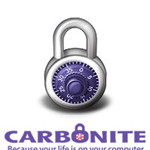Carbonite: Cloud-based Backup Leader
 Data backup, storage, and recovery systems, once affordable for only the largest corporations and elite government agencies, are now accessible to mid-sized corporations, small businesses, and every day PC users. The sea change has occurred largely as a result of falling storage costs. Six years ago, the storage cost per gigabyte (GB) was $10.00. The price fell to $4 per GB in 2008, and to $2 per GB in 2011, according to data gathered by IDC. As an insurance policy against hard drive failure, accident, and theft, low priced hard-drives, flash drives and discs have become common for consumer and small business data back up.
Data backup, storage, and recovery systems, once affordable for only the largest corporations and elite government agencies, are now accessible to mid-sized corporations, small businesses, and every day PC users. The sea change has occurred largely as a result of falling storage costs. Six years ago, the storage cost per gigabyte (GB) was $10.00. The price fell to $4 per GB in 2008, and to $2 per GB in 2011, according to data gathered by IDC. As an insurance policy against hard drive failure, accident, and theft, low priced hard-drives, flash drives and discs have become common for consumer and small business data back up.
The falling cost of storage has made it compelling for consumers to store more data on their computers, including storage intensive media, such as pictures and videos. At the same time, the proliferation of mobile computers, including laptops, notebooks, netbooks and tablet computers, coupled with smart phones have created a need for more frequent backup, as the probability of loss or theft has risen significantly. 247 million laptop, notebook and netbook computers were shipped around the world in 2010, along with 146 million desktop PCs, according to market researcher IDC. Tablet PCs have quickly arisen to contribute another 10 million –plus units annually.
The rising use of the internet for all things digital, and the increasing trust that consumers and small businesses place in cloud computing, with its data encryption technologies and storage on remote servers located in often far away data centers, has created a new market for data backup, based in the cloud, and accessible at an affordable price.
Carbonite’s initial focus and by far the lion’s share of revenue that drives the business today is the home-based Windows and Mac market, where consumers pay a nominal $59 per year fee for an insurance policy against the aforementioned risks. Competition is widespread in this market, with some companies offering free storage, or storage bundled with other products. Nevertheless, Carbonite has developed a series of competitive advantages based on its brand awareness, which emphasizes trust, as well as its technology infrastructure, and, thus far, management execution.
Carbonite has many competitors in both the consumer and small business segments, as the barriers to entry to the market are quite low. However, just like in the early days of cloud-based salesforce automation, when Salesforce.com amassed a large market position based on the simplicity of its solution, combined with strong sales and marketing, so too does Carbonite have the opportunity to gain share in its addressable market, despite the existence of many competitors at this stage of the market’s development.
In the consumer market, Carbonite faces competition from a large number of little known players, as well as large behemoths, that have seized upon data storage as a way to keep customers in the fold. Thus, Apple, through its iCloud service, Microsoft, through its SkyDrive service, and Amazon.com, for its Kindle Fire tablets, is bundling free storage services with their products. While this poses a threat to Carbonite’s rate of growth, the company’s affordable, easy to access service, which emphasizes backup and restore –not just storage—across multiple computer platforms, should enable the company to achieve solid growth.
In the small business market, competitors include Symantec, McAfee (now a division of Intel). Both companies bundle backup and restore capabilities into their security software suites, but the products are not easily accessed, and are often difficult to use. EMC’s Mozy division delivers cloud-based backup, and currently serves over 70,000 small businesses through its subscription-based services. While EMC has made more than a symbolic entry into the cloud-based backup and storage market, the company continues to derive the lion’s share of its sales from large disk storage systems which it sells to large corporate customers that utilize their own data centers, rather than harness storage in the cloud. Rackspace Hosting also competes in the market, and other competitors include Dropbox, Box, CommVault, Databarracks, and Zamanda.
With its new $229 and $599 small business backup service, Carbonite will be quite competitive with other small business offerings on the market, including those offered by Mozy, Backblaze, and DropBox. The Carbonite offerings will be anywhere from 20 to 75 percent less than equivalently packaged configurations from these competitors, based on current prices.
